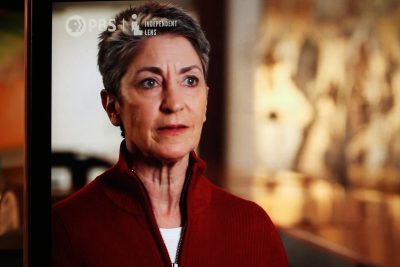While the United States sees continued economic turmoil due to the pandemic, the Bright Lights Film Series at Emerson College adopted a poignant theme for its 12 films throughout the spring semester: “economic justice.”

Anna Feder, the director of Emerson’s Visual and Media Arts Department and the curator and manager of the free and public Bright Lights Film Series, said this year’s theme is exceedingly relevant.
“[It] is perfect for where we are right now,” Feder said, “talking about the importance of labor unions, talking about a national $15 minimum wage, talking about meaningful financial support for folks who are struggling because of COVID right now.”
This week’s film, “9to5: The Story of a Movement,” focused on the origins of Boston’s women’s movement in the early ’70s.
The 2020 documentary — directed by Oscar-winning duo Julia Reichert and Steven Bognar — was screened Wednesday and Thursday, Feder said, but the discussion was special to Thursday’s viewing.
The screening was presented in partnership with PBS Independent Lens. The film will be available on PBS and PBS Video App after Feb. 1.
The film highlighted the 9to5 movement in Boston — where secretaries from across the city protested against unfair wages, sexual harassment and inequalities in the workplace.
Though the protest was the start of a national movement, it is largely forgotten in history.
“It’s about a very specific sort of section of the women’s movement, a particular labor thread to the women’s movement,” Feder said. “They were a huge force and realized their power through organizing.”
Following the screening, which was available on the platform OVEE, two activists featured in the film participated in a discussion via Zoom.
Prior to the pandemic, the film festival would show 22 films per semester in the Paramount Center, with a live discussion right in the theater, Feder said. While the pandemic has made those interactions difficult, Feder said the virtual model has allowed the screenings to be more accessible to the public.
The question and answer session featured Ellen Cassedy of the 9to5 Boston chapter, who has since become a writer, and Mary Jung of the Cleveland chapter, who has gotten involved in politics.
For Cassedy, the film was a step back in time.
“We made history, and it was such a thrill to watch, so many great, fearless, fierce women on the screen,” she said during the discussion. “The filmmakers got it all right. I don’t have anything that I would change.
Cassedy said the film captured the heart of what it means to be an organizer and an activist.
“They brought out that organizing is a craft that requires vision,” she said, “but also incredible attention to detail and attention to each person, who is each person, what are her strengths, what can she do, how can she be a leader.”
Cassedy also talked about the importance of creating a space for a cause if it doesn’t fit the existing movements, just as the movie discusses.
“You look at the labor movement and you think ‘it doesn’t really quite fit what I’m looking for,’” she said, “Well, we felt that way and we created a woman-led union that really showed the way for other creative efforts in the labor movement.”
Cassedy and Jung both said unions are important because they better the workplace — from improved wages to more ideal experiences overall — because they hold bosses accountable.
“There’s so many people who say the union made the workplace work better,” Cassedy said. “People who felt sort of ignored or overlooked on the job really came into their own, and both in the union and on the job.”
Jung said she hopes people who watch the documentary learn that movements like 9to5 do not happen because of individuals, but because of many coming together.
“People need to understand that there is collective power,” Jung said. “All of us working together will go a lot further than going alone.”
Jung said she hopes the film empowers people to know they too can create change.
“Don’t give up,” Jung said. “Because if you have a goal, or if you see something that’s wrong, you can actually do something about it.”
Feder, who said she is one of the organizers of the Emerson Staff Union, said this film not only speaks to gender equality, but also the current calls for economic justice because of COVID-19.
“It’s seeing how far we’ve come, what these women helped us to gain,” Feder said, “but how much further we have to go.”
Bright Lights strives to ensure at least 50 percent of the films selected are directed by women. The screening series also intentionally seeks to highlight queer films, films made by people of color and films representing disability.
Grace Rietta, a sophomore in Boston University’s College of Communication, said female representation in film-making is really important to her and is something she has been noticing more. She said it’s a “really great” time to be a woman in film.
“I’ve seen people like Lulu Wang and Greta Gerwig win Oscars or get nominated or be some of the most popular films of the year,” Rietta said. “It feels like a really good time to be a woman in film, and I think it took about damn time.”



















































































































